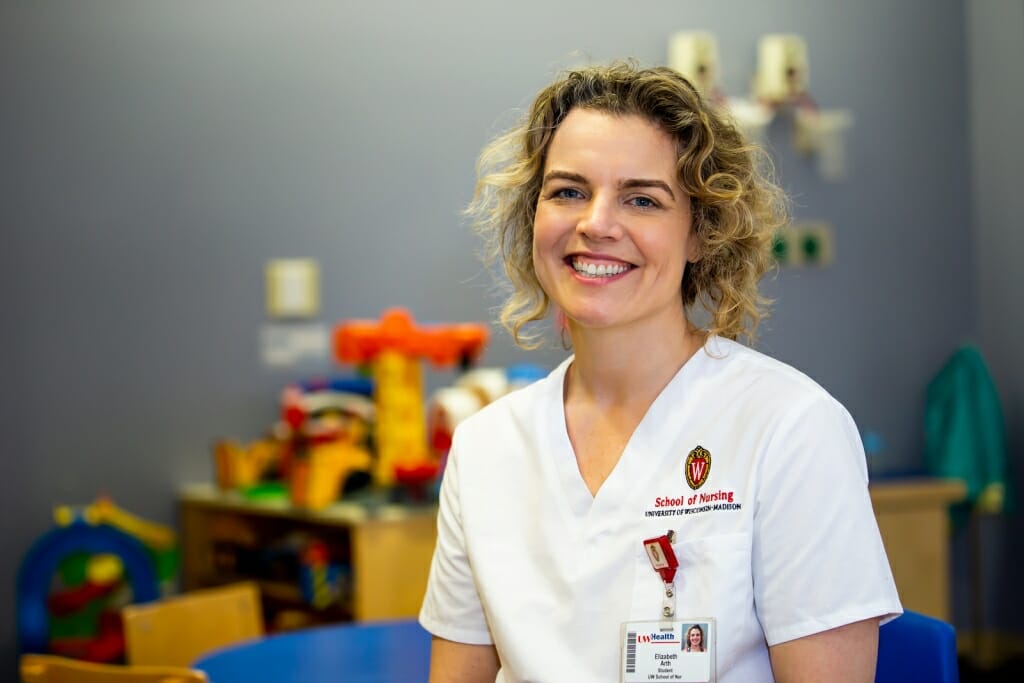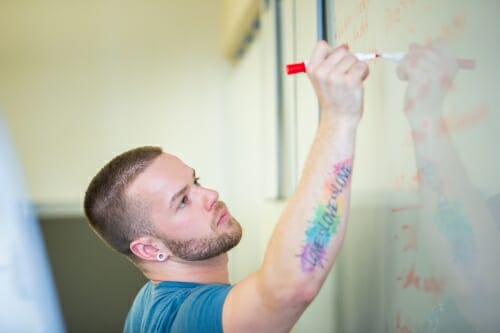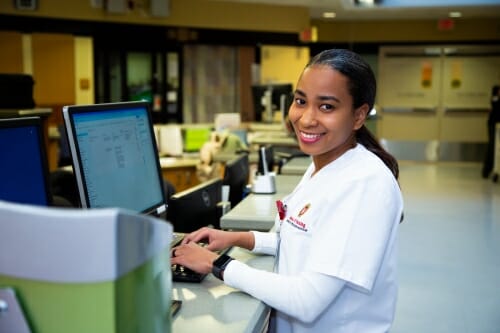UW Changes Lives: Got a bachelor’s? UW-Madison nursing degree could be just 12 months away

Four years ago, Elizabeth Arth, 42, helped her son, Henry, recover from a spinal-cord injury during a long stay at American Family Children’s Hospital in Madison. Her last clinical rotation for her one-year bachelor’s program was on the same floor as that difficult but ultimately rewarding hospital stay. Alexander André
From February through June, we will be highlighting the ways that UW–Madison changes lives for the better throughout the state of Wisconsin. May’s theme is Jobs and the Economy. Watch for more at #UWChangesLives on social media. And here’s how you can help.
Day-to-day life for Elizabeth Arth and her son Henry came to a screeching halt in 2015 when Henry, then 14, had a spinal cord injury from a bike crash.
Henry spent 17 days healing and relearning to walk at American Family Children’s Hospital in Madison. Elizabeth did what any mother would do: wait, worry, keep her son’s spirits up and hope for the best.
She also did something more unusual: chose a new career. “I’d had experience with childbirth education and was always interested in health science,” she says, “but there was a moment in the hospital where I started to look at what the nurses were doing, how they were caring for my son and our family. So I decided during that time to go to nursing school. I began taking prerequisites almost immediately.”
Arth, a Madison resident who was then 39 years old, wanted a quick career transition, so she enrolled in the first class of the new accelerated bachelor’s of science in nursing (ABSN) at the University of Wisconsin–Madison School of Nursing.
Arth will graduate on May 11 along with the other 31 people in her class. And for her last clinical rotation, she’s posted on the same floor of American Family where she spent so many anxious days watching Henry re-learn to walk with help from surgeons, physical therapists and, yes, nurses.
At the graduation, you can bet Henry will be the proudest person in the audience.

Mathew Trapp, 26, will graduate with the first accelerated bachelor’s of science in nursing class at UW–Madison. After working as a server in fine dining establishments, he says, “Nursing care is very relatable to the service industry, where you are following a set of steps to ensure a quality experience. In health care, we have steps to assess, diagnose and treat. Nursing is so patient centered, family centered. The best experience in the hospital hopefully will foster a favorable outcome.” Photo by Alexander André
The ABSN “covers the same nursing topics as our four-year, undergraduate degree,” says Wendy Crary, program coordinator at the School of Nursing.
Applicants need a bachelor’s degree from an accredited institution, a 2.75 GPA, and seven science prerequisites. Between course work and five clinical placements, students are engaged for 50 hours a week. Graduates are eligible to test for an RN license.
As medicine gets more technological and complex, the rationale for equipping nurses with a bachelor’s in science becomes more convincing, Crary says. “BSN-prepared nurses can look for research to support their nursing actions, rely on the evidence. BSN-prepared nurses are comfortable with the patient’s education prior to discharge, so we have a more informed patient going home. And evidence shows they have fewer hospital acquired infections, fewer readmissions, quicker recovery.”
The one-year program offers a second chance for adults seeking a satisfying, well-paying job. It is also part of a full-court press by the School of Nursing to confront a shortage of nurses in Wisconsin. The Wisconsin Center for Nursing’s 2016 workforce report projected a statewide shortfall of nearly 23,000 nurses by 2035.

Aniqueka Scott, 33, was educated in Mexico, worked in Haiti, and plans to practice nursing in Madison after graduation. Photo by Alexander André
“The nursing shortage is there, it’s present, and it’s increasing,” says Darby Sugar, student services coordinator and academic advisor at Nursing. “We are consistently looking at ways to help with the shortage and increase our class sizes.”
Fully 86 percent of UW School of Nursing graduates live and work in the state, so ABSN alumni are likely to benefit Wisconsin directly.
For college graduates who want to quickly advance their careers, the intense, one-year ABSN offers a life-course correction. “I thought the only way to get into health care was medical school, but I never connected with that,” says Mathew Trapp, 26, who has a bachelor’s in neuroscience from UW–Madison. After working as an EMT and an emergency department technician, “I realized that health care was what I wanted to do all my life. Working in the hospital, I noticed that nurses were on the front line, interacting with patients, and I realized nursing was where I wanted to be.”
Aniqueka (An-ee-ka) Scott, 33, a native of Trinidad and Tobago, came to the ABSN program with a master’s in public health and broad international experience in health care, including a year in Haiti. “I organized training for hospital staff,” she says. “I was also heavily involved in setting up community clinics, and I raised over $7,000 to fund them.”
In her spare time, Scott taught English and computer literacy to hospital employees four afternoons a week. “People who did not know how to use a mouse began creating Word documents and Excel spreadsheets,” she says.
But she was not satisfied. “I thought I was doing an important job, but I wanted to be more hands-on in my approach to health care. I found the accelerated program very attractive, as I wanted to jump-start my nursing career as soon as possible. It was what I was looking for.” Scott has accepted a nursing job in Madison.
That purposeful attitude is typical of the ABSN students, says Sugar. “Because this is a second degree, the students already have the confidence to succeed: It’s, ‘I know what it’s like to go through school, how to hit a roadblock and overcome it.’ In this program, they are ones with their heads down, their eyes on the end of the road. It’s, ‘Let’s get this done. I’m not going to mess around. I’m going to do this well.’ They are working really hard. It’s an intense program, timewise and academically.”
The new BSN program gets students into the workforce much faster, Sugar adds. “The strong interest in applying during our first two years signifies that people with existing college degrees appreciate this opportunity.”
All 32 members of the class of 2019 will graduate on schedule, Sugar says, and she has heard that 25 already have jobs or job offers.
Forty members of the second ABSN class will get to work May 20.
